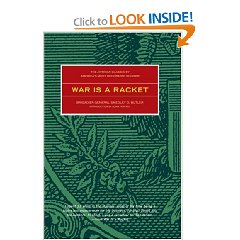This book is a real gem, a classic, that should be in any library desiring to focus on national security. It is a very readable collection of short essays, ending with a concise collection of photographs that show the horror of war–on one page in particular, a pile of artillery shells labeled “Cause” and below is a photo of a massive pile of bodies, labeled “Effect.”
Of particular interest to anyone concerned about the current national security situation, both its expensive mis-adventures abroad and its intrusive violation of many Constitutional rights at home, is the author's history, not only as a the most decorated Marine at the time, with campaign experience all over the world, but as a spokesperson, in retirement, for placing constitutional American principles over imperialist American practice.
The following quotations from the book are intended to summarize it:
“I helped make Mexico, especially Tampico, safe for American oil intersts in 1914. I helped make Haiti and Cuba a decent place for the National City Bank boys to collect revenues in. I helped in the raping of half a dozen Central American republics for the benefits of Wall Street. The record of racketeering is long. I helped purify Nicaragua for the international banking house of Brown Brothers in 1909-1912. I brought light to the Dominican Republic for American sugar interests in 1916. In China I helped to see to it that Standard Oil went its way unmolested.” [p. 10]
“War is a racket. …It is the only one in which the profits are reckoned in dollars and the losses in lives.” [p. 23]
“The general public shoulders the bill [for war]. This bill renders a horrible accounting. Newly placed gravestones. Mangled bodies. Shattered minds. Broken hearts and homes. Economic instability. Depression and all its attendant miseries. Back-breaking taxation for generations and generations.” [p. 24]
General Butler is especially trenchant when he looks at post-war casualties. He writes with great emotion about the thousands of tramautized soldiers, many of who lose their minds and are penned like animals until they die, and he notes that in his time, returning veterans are three times more likely to die prematurely than those who stayed home.
This decorated Marine, who understands and documents in detail the exorbitant profits that a select few insiders (hence the term “racket”) make from war, proposes three specific anti-war measures:
1) Take the profit out of war. Nationalize and mobilize the industrial sector, and pay every manager no more than each soldier earns.
2) Vote for war or no war on the basis of a limited plebisite in which only those being asked to bear arms and die for their country are permitted to vote.
3) Limit US military forces, by Constitutional amendment, to home defense purposes only.
There is a great deal of wisdom and practical experience in this small book–Smedley Butler is to war profiteering what S.L.A. Marshall is to “the soldier's load.” While a globalized world and the complex integration of both national and non-national interests do seem to require a global national security strategy and a means of exerting global influence, I am convinced that he is correct about the fundamentals: we must take the profit out of war, and restore the voice of the people in the matter of making war.
The Fog of War – Eleven Lessons from the Life of Robert S. McNamara
Why We Fight
Fog Facts: Searching for Truth in the Land of Spin
Lost History: Contras, Cocaine, the Press & ‘Project Truth'
Weapons of Mass Deception: The Uses of Propaganda in Bush's War on Iraq
American Fascists: The Christian Right and the War On America
The Unconquerable World: Power, Nonviolence, and the Will of the People
The Lessons of History
The Landscape of History: How Historians Map the Past





